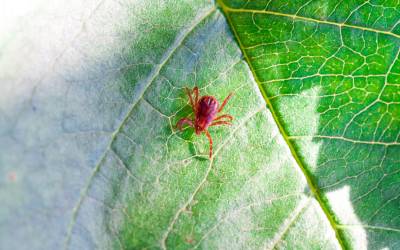
Serving Tennessee & Virginia
If you’ve ever had chigger bites, it’s safe to say you don’t want that experience again. Chigger bites are extremely itchy, and unfortunately, in many parts of Tennessee and Virginia, chiggers are extremely common. In this article, we’ll talk about how to prevent chigger bites through a combination of practical advice for avoiding chiggers in the wild and how to eliminate chiggers on your property.
How can I prevent getting chigger bites?
Are chiggers insects? Are they ticks? What are these little bugs that look like fast moving tiny red dots moving in the grass? Technically, chiggers are mites. And with how small they are, they can be on you before you even realize it.
There are two main ways to reduce your risk of chigger bites. The first is protecting yourself in areas where chigger mites may be present and avoiding those areas if at all possible.
How to Reduce Your Risk of Encountering Chigger Mites Outdoors
- Wear protective clothing long sleeve shirts, tall socks, long pants tucked into boots. Although this won’t eliminate the possibility of chiggers latching onto you, it will reduce it.
- Treat skin and clothing with bug spray before entering areas where chiggers may be present.
- Stay on trails when you go hiking. Avoid areas with overgrown grass or vegetation.
- Be cautious or avoid activities altogether in wetlands areas, wooded areas, or areas with overgrown vegetation.
How to Get Rid of Chigger Mites in Your Yard
Of course, if you have chiggers on your own property, you don’t have the option of avoiding them. Fortunately, there are some things you can do to get rid of them and prevent them from coming back.
- Identify “chigger-friendly” areas: Tall grass, weeds, and dense vegetation offer ideal habitats for chiggers.
- Mow and trim your grass regularly: A well maintained yard minimizes the places where chiggers can hide. Be sure to clean up leaves, clippings, and other organic debris.
- Create a barrier: Chiggers prefer to stay in grassy areas, so use gravel or wood chips to discourage them from entering an area.
- Nematodes: Treating with beneficial nematodes can control chigger populations naturally.
- Attract birds: Many bird species eat chiggers and will gladly help you reduce chigger populations in your yard.
- Hire an experienced chigger extermination company: Our specialists are ready to assist you, so give us a call today.
Need help with Chigger Mites?
Click the button below to get started with a quote.
What should you do if you have chigger bites?
Chigger bites can be extremely itchy but try to avoid scratching them as much as possible. If you scratch them, they’ll become inflamed and itch worse.
Here are some things you can do to make yourself feel more comfortable:
- Apply anti-itch cream or lotion to help you resist the urge to scratch.
- Your skin will be sensitive in the area, so consider trimming your fingernails to prevent skin tears.
- Take a warm shower.
- Wash your clothes in hot water.
Seek medical attention if the itching lasts two weeks or more, if the area swells or leaks with pus, or if the bite area turns into an open wound due to scratching.
Call Leo's Pest Control for Chigger Control Services in Tennessee & Virginia
If you’re dealing with chiggers at your home or business property, it’s hard to know where to start. At Leo's Pest Control, we do the hard work for you – and we get results. We’ve been the trusted pest control company for chigger extermination in the Bristol and Johnson City area since 1965.
Give us a call today and get a free quote!
Chigger Prevention FAQs
Q. Where do chiggers live?
Chiggers’ range is all over Tennessee and they’re most abundant in spring and summer when it’s warm. Outdoor areas with overgrown grass or vegetation, wooded areas, and areas near water are more likely to have chiggers.
Q. Do chiggers carry disease?
No, that’s the good news about chiggers. They’re not known to spread diseases to humans. They may, however, cause allergic reactions or severe reactions in sensitive individuals. It’s also hypothesized that chiggers could possibly carry alpha-gal, the enzyme that causes red meat allergies, but this has not been confirmed.
Q. Do adult chiggers bite?
Adult chiggers don’t bite. Chigger larvae are responsible for all chigger bites.
Q. Can chiggers get inside my home?
No. Chiggers do not go inside houses.
Back to Flea and Tick Exterminators – Control – RemovalHow to Prevent Chigger Bites in Bristol Tennessee in Bristol TN
Serving Tennessee & Virginia
